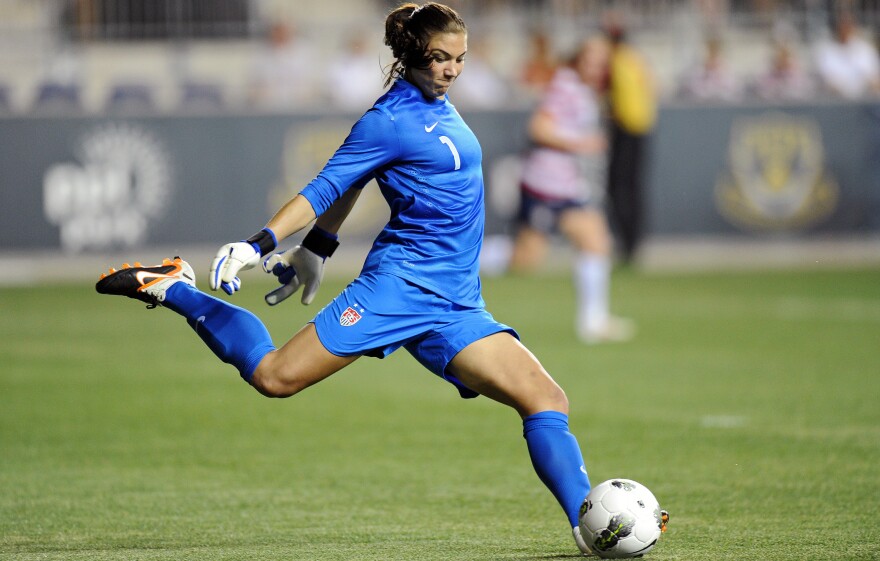Hope Solo is generally regarded as the best women's goalkeeper in the world. Fresh off winning her third-straight Olympic gold medal with the U.S. national team, Solo has been as busy off the field as on it, releasing an autobiography titled Solo: A Memoir of Hope.
The memoir details her rise as an international celebrity, but it also focuses on the complicated relationship she had with her father, who taught her to play soccer.
The man she knew as Gerry Solo was quite the enigma — he had multiple social security numbers and names, even additional children that Solo found out about when she was young. For a time, her father was homeless and even was accused of murder. Although his name eventually was cleared, it's wasn't before his death in 2008.
Solo tells weekends on All Things Considered guest host Cheryl Corley how she came to terms with not always knowing who her father was, and how that shaped who she is today.
Interview Highlights
On her father:
"I think at an early age I learned not to judge people. My father showed me so much love. He showed my brother so much love. He just, he had a rough life. You know, he grew up in a boys home in the Bronx. He didn't really know his own family. So I couldn't hold it against him that he didn't know how to parent. He didn't know how to be the perfect husband. But he loved as much as he could. And that love was pure."
On her mother:
"She struggled, abusing alcohol for quite some time, and so we just kind of drifted apart. I went to college. But I dedicate the book to her because she is the true champion of the family. She kept our family together. She provided us with a roof over our head. She always worked. My father was never around. But I glorified my father, and I was always daddy's little girl. He was my first soccer coach. And I always just had a dream to spend more time with my father. But at the end of the day, my mom was the one who kept me in soccer, who kept me, you know, doing my homework, who provided me with meals on a daily basis. You know, she was the strength of our family, and I didn't realize that until I got a little bit older."
On whether she and her outspokenness are held to a different standard because she is female:
"I've felt that for quite some time. It has been hard, because I have given my life to the game and to the sport. And I put all of my energy into building the game and giving women opportunities and, you know, to put everything into it and then to be deemed selfish or not a good team player or outspoken, it's been hard. But at the same time, I'm going to get the critics and I know that. But I know that I'm breaking down barriers. And I know that in the end I'm doing a great thing."
On her advice to young soccer players:
"I hate the cliche of 'just have fun,' but what I've seen in today's sports, especially with parents, is they put so much pressure on the kids. ... But for me, the reason why I became successful is because I play with passion. And, you know, I let that passion and that fire just build inside of me. And it came out on the soccer field. It wasn't forced, you know, people didn't put pressure on me. I just played for the love of the game."
Copyright 2023 NPR. To see more, visit https://www.npr.org.



